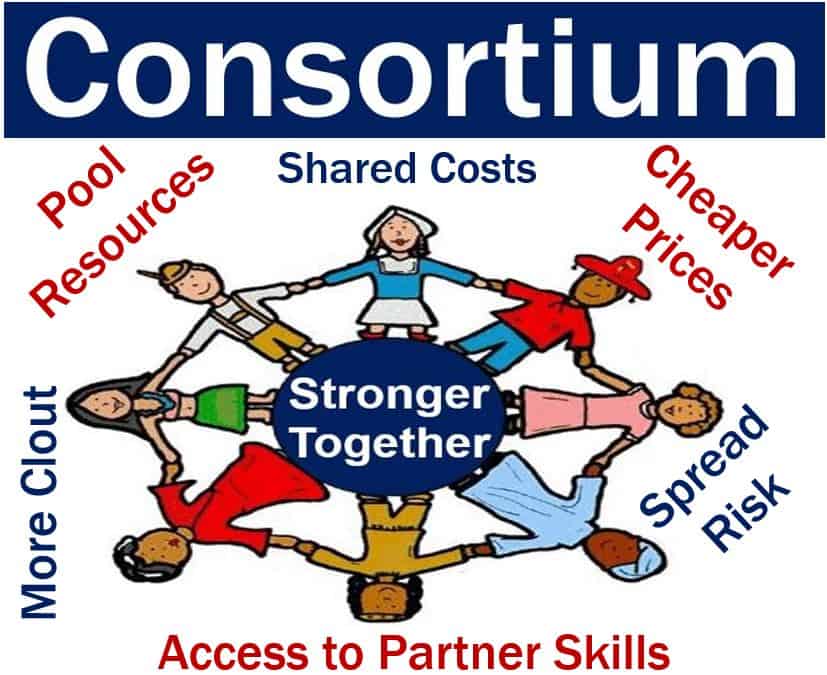A Consortium is an alliance of companies, individuals, or other entities that got together to achieve a specific objective. The objective benefits all the parties. Examples include lobbying for regulatory changes, bidding on a large project, or increasing partners’ purchasing power to get better deals.
In other words, it is a business club that offers benefits to its members.
A consortium is similar to a syndicate. However, it does not last as long as a syndicate. The plural form is consortia or consortiums.
In banking, however, a syndicate is a consortium of financial institutions. They get together to arrange a large loan. We call it a syndicated loan.
In the UK, people create consortia to buy out football (US: soccer) clubs that are struggling. In other words, they want to keep them going. The benefit for the members is the survival of the club rather than profit. Put simply; they love their club and don’t want it to die.
According to CambridgeDictionary.org, a consortium is:
“An organization of several businesses or banks joining together as a group for a shared purpose.”

Consortium can take many forms
Consortia are short-term arrangements in which members pool their human and financial resources. Together, they undertake a major project from which they will all benefit. Even entities from different countries can get together and form consortia.
Members might be people, companies, or organizations. Members may also be governments.
‘Consortium’ is Latin for ‘partnership, association,’ or ‘society.’ The word derives from the Latin word ‘Consors,’ which means ‘partner.’
Consortium in the travel industry
In travel and tourism, for example, consortia are common. Independent travel agents and agencies get together. They can subsequently increase their purchasing power, commissions, and amenities for their customers.
However, not any company can join a consortium. Travel agencies, for example, need to meet threshold sales volumes. However, when they join they can enjoy important benefits.
Consortia members get commission overrides, agent training & education, and networking opportunities. Members also benefit from client referrals.
Consortiums negotiate with cruise lines, airlines, hotels, resorts, and other travel and tourism suppliers. They do this on behalf of their members.
Agency clients benefit in the form of upgrades, special promotions, and room amenities. These items are not available to non-members.
The most famous consortia in the travel industry are Travel Group, Vacations.com, Signature Travel Network, and Virtuoso.
Coopetition
Coopetition – a combination of cooperation and competition – is a consortium of competitors that cooperate in areas non-strategic for their core businesses.
They form alliances to reduce their costs in these non-strategic areas. For example, the GENIVI Alliance is a non-profit-making consortium between rival automobile manufacturers. It aims to facilitate building an in-vehicle infotainment system.
The World Wide Web Consortium (W3C) standardizes web technologies like CSS, XML, and HTML.
Setting up a consortium
Consortia provide huge benefits for their members. By working with several organizations which add value, each member can secure additional income. They can also diversify and provide better services.
However, setting one up is a major undertaking. There are administrative and cost burdens. Furthermore, it takes a major commitment from all partners.
If you aim to set up a consortium, think about it carefully. Above all, you should consider how much work it will require.
Before taking any steps toward creating one, you must determine who you plan to invite to become partners.
It is essential to establish a clear legal framework outlining each partner’s roles, responsibilities, and the distribution of profits or costs, to prevent disputes and ensure smooth operation.
Video – What is a Consortium?
This video presentation, from our sister channel on YouTube – Marketing Business Network, explains what a ‘Consortium’ is using simple and easy-to-understand language and examples.
